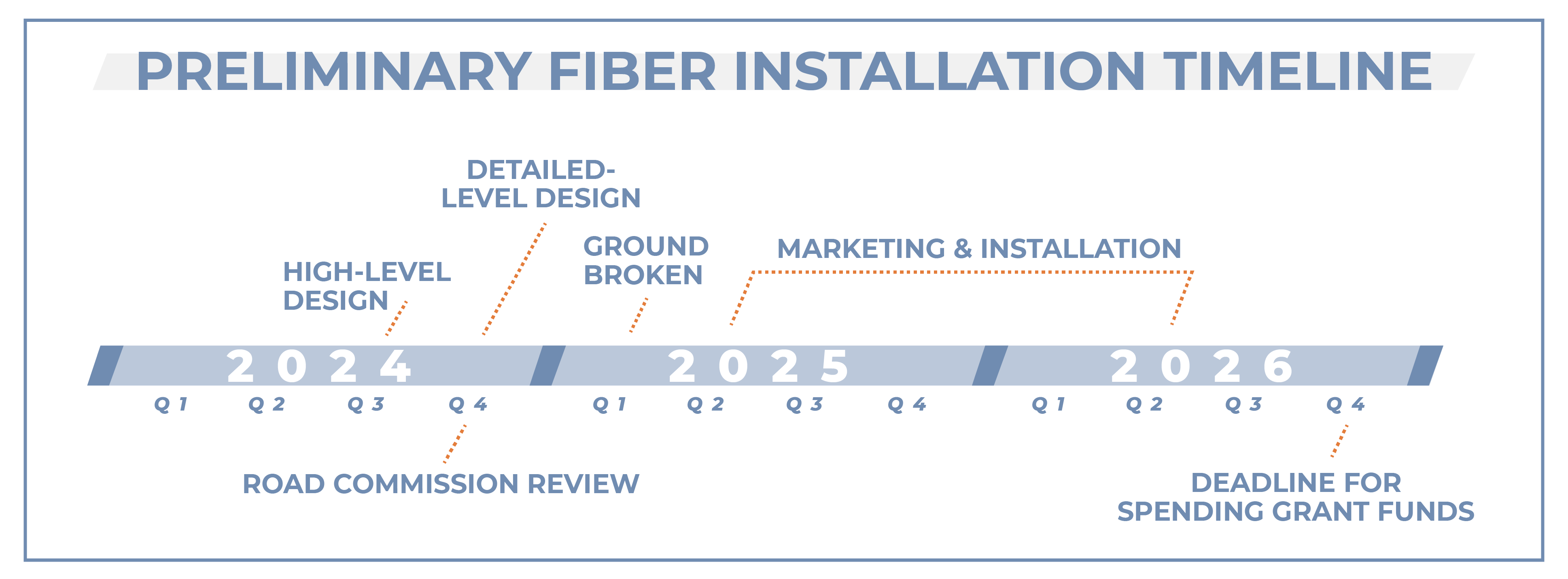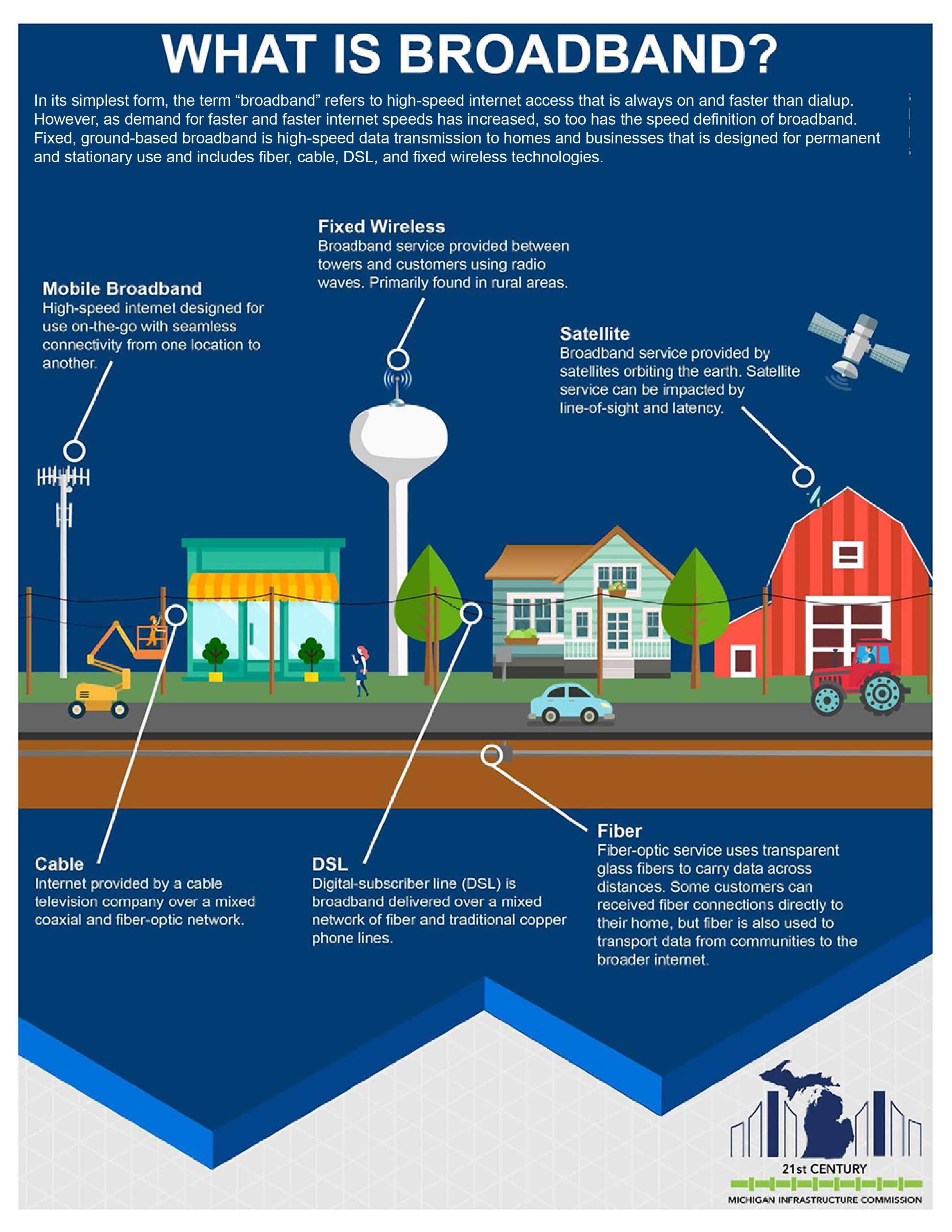
Ottawa County leverages $16M for countywide internet coverage. Learn more:

As the way we use technology has evolved from opening files on floppy disk drives to cloud computing, so has the demand for internet connectivity. The way education, business, health care, and social interaction are increasingly being conducted makes it clear high-speed internet service is no longer a luxury – it is a necessity both now and into the future.
But broadband service in Ottawa County continues to be inconsistent – many areas lack service, experience poor service, or residents simply can’t afford high-speed internet. Ottawa County is actively working to address these persistent gaps in high-speed internet service through a new Digital Inclusion Strategy.
Get Involved!
Follow 123NET's Update Center for Ottawa County
123NET, Ottawa County's partner for fiber infrastructure development, has created a webpage to share information about the ongoing broadband project. Residents are encouraged to join 123NET's email list to stay updated on construction plans and current maps. Please note that current plans are preliminary and will be updated periodically.
Learn MoreLearn About Our Partners
-
Next Steps
Current Efforts

In spring 2024, Ottawa County and broadband partner 123NET received final grant approvals for the state’s Realizing Opportunity with Broadband Infrastructure Network (ROBIN) grant. Approximately $9.7 million in state funds, paired with $4.3 million in matching funds from the County and $2.2 million from 123NET, will be allocated to build 250 miles of fiber, improving access for nearly 6,000 residents.
Although the County had planned for more funding – $7.5 million in ARPA dollars were initially set aside for broadband expansion – refinements made by the Michigan High-Speed Internet Office reduced the scope of this specific project. DSI will continue to pursue other avenues to plug coverage gaps and leverage the remaining $3.2 million originally earmarked.

Ongoing Efforts
ROBIN stands for Realizing Opportunity with Broadband Infrastructure Networks. This grant program is operated by the State of Michigan to fund middle mile broadband internet infrastructure. Ottawa County applied for the grant with 123NET and was awarded in the second round of funding.
The ROBIN grant will get the ball rolling on fiber construction, but further funding will be needed to address the households that were not eligible. The next grant Ottawa County will be seeking is from the Broadband, Equity, Access, and Deployment Program (BEAD).
You can help the County demonstrate need in your area by submitting a challenge to the FCC’s Broadband Availability Map, which the BEAD program will be utilizing.
On that website, after searching your address, there is an option for “Availability Challenge”.
You can challenge service availability from any of the listed providers, as long as you have some proof in writing they don’t serve your address. That could be correspondence (email, mail), from their website, or other promotional materials. Learn more about submitting a challenge by visiting the FCC’s Broadband Data Collection Help Center.

-
Broadband FAQ
What is Broadband?
Broadband refers to high-speed internet access that is always on and available. According to the Federal Government, broadband speeds must be faster than 100 megabits per second for downloads and 20 megabits per second for uploads - 100/20 mbps.
Why do we need it?
Extensive research was conducted by the Department of Strategic Impact over the past several years to demonstrate that there are significant gaps in reliable broadband internet coverage in Ottawa County. The Executive Findings Report showed that 10.5% of households had no internet access and 74.3% had service below 100/20 mbps. The 250 miles of fiber and enhanced fixed wireless coverage will provide improved access to nearly 6,000 residents.
How much are we paying?
Ottawa County and 123NET formed a public private partnership to secure the ROBIN Grant funding. To maximize the potential of the Ottawa County ARPA funding, the County put forward $4.3M to leverage $16M.
ROBIN stands for Realizing Opportunity with Broadband Infrastructure Networks. This grant program is operated by the State of Michigan to fund middle mile broadband internet infrastructure. Applicants must form public-private partnerships and target underserved and unserved areas. Ottawa County applied for the grant with 123NET and was awarded in the second round of funding.
- Ottawa County ARPA: $4.3M (another $3.2M is being reserved to leverage BEAD funding)
- 123NET: $2.2M
- State of Michigan ROBIN Grant Award: $9.7M
- Total Project: $16M fiber construction project
Am I going to get coverage?
Maybe. This project will bring new or improved speeds to over 3,000 priority households. Throughout Spring and Summer 2024, 123NET and Ottawa County will work together to develop final engineering plans. Check out the 123NET website for Ottawa County to see what infrastructure may be located near your address. If your address is not included in the current project plans, please rest assured these are ongoing efforts and we will continue to advocate for and expand broadband availability.
-
Broadband Data Collection Survey

Broadband Data Collection Survey
Before improving broadband coverage could realistically begin in Ottawa County, accurate data was needed. Funded by the County and its strategic partners, a survey was conducted by initiative partner Merit Network, an Ann Arbor-based internet research and educational organization.
Initiative partner and survey creator Merit Network carefully reviewed survey and speed test data collected through the end of 2021 from County residents and businesses and released a detailed report.
Presented in spring 2022, the survey showed major gaps in broadband access and clearly showed service is insufficient, and there is significant demand throughout Ottawa County
Explore the Data
- Broadband
Data Collection - Executive Findings Report
This PDF document summarizes the survey process and offers key takeaways in easy-to-digest graphics and charts.
- Broadband
Data Collection - Topline Report
This PDF document offers a more comprehensive look at survey speed and broadband availability data, as well as an overview of respondents' opinions and assessments of Internet service.
- Broadband
Data Collection - Executive Findings Report
-
What About Satellite Internet Service?
Satellite internet service is available from a handful of telecommunications companies in our area. Prices for conventional satellite run at least $15-$20 per month more than conventional broadband services, and historically have had slower download speeds.
What about Starlink?
High-tech Low-Earth Orbit (LEO) satellite wireless service are being invested in and deployed by tech giants such as Elon Musk and Jeff Bezos. It's true Starlink is a gamechanger for millions without access worldwide. Although current County efforts are focused on ground-based solutions, this emerging technology could offer an immediate broadband service option to underserved residents and businesses.
Learn more about Starlink in our Starlink vs. Fiber guide.
-
Where We've Been
Since the beginning of high-speed internet, Ottawa County has been involved in improving service and building infrastructure. The Ottawa County Board of Commissioners has actively supported enhanced broadband for residents and businesses for well over a decade. The County has had multiple successes with expanding broadband into previously underserved areas through collaborative public-private partnerships. Here’s a closer look:
Expansion of Cellular and Data Coverage
In the late 2000s, the County partnered with Sprint (now part of T-Mobile) to upgrade and expand its wireless broadband network. In exchange for Sprint investing $1 million to enhance and expand high-speed wireless service to the County’s rural areas, local officials, whenever possible, assisted with expediting permitting, zoning approvals, and site assessments needed to upgrade and expand the existing wireless network.
Eventually, the County worked with Verizon and AT&T to fill coverage gaps by constructing cell towers in underserved areas. Cellular and data coverage in more rural parts of the County improved significantly.

Hotspot Device Lending Initiative

Beginning in 2018, the County partnered with three area libraries to initiate a Mobile Hotspot Device Lending Initiative. This program allows residents to check out the portable devices from their local library for on-the-go access. With the support of this Department, eventually all nine Ottawa County libraries received a Library of Michigan Library Services and Technology Act (LSTA) grant to expand the program, making the devices available for loan to the county’s more than 300,000 residents.
Connect Michigan Report
In 2018, in an attempt to better understand regional challenges, over a dozen counties in West Michigan – including Ottawa – partnered with ConnectMichigan, a nonprofit working to expand broadband.
A community technology assessment was performed to identify deficiencies and opportunities for improving local broadband access to advance economic, social, and educational opportunities for families, businesses, and community institutions.
A comprehensive Community Technology Action Plan was created. Unfortunately, the results of that effort did not provide the level of granularity needed to thoroughly and accurately understand the county’s true broadband landscape. These issues are further explained below under “Continued Issues”

-
Continued Issues
Although the County has taken an active role in improving high-speed internet access, these efforts alone haven’t solved the problems we face.
Consider:
Community Technology Action Plan Held Back by Inaccurate Data

The FCC maintains maps that illustrate broadband coverage across the Country based on Census blocks. Census blocks vary widely in size based on population density. For example, a Census block in the city of Holland can be dramatically smaller than a block in a less densely populated township. As the map at left shows, if one home in a Census block has access, FCC maps represent that the whole block has access, skewing the data. Because the Action Plan was based on Census block data, it failed to drill down far enough to truly determine any gaps in connectivity. Additionally, inaccurate FCC maps have delayed and in some cases disqualified the County from qualifying for grants to plug these gaps in service.
Wireless Internet not a standalone solution
Wireless internet as a last-mile solution (wireless service into homes) is not always practical. Tower proximity, network congestion, data caps and limited upload/download speeds can all factor into service availabililty
Caveats aside, as technology improves and infrastructure solutions are developed to expand reliable broadband to unserved rural areas, wireless can offer advantages when combined with other technologies to cost-effectively extend services.
The County’s evolving infrastructure solutions to extend broadband countywide will involve the use of some wireless internet for local infrastructure needs as necessary and practical to supplement planned fiber routes.
As part of accepting funding from the state ROBIN grant in 2023, Ottawa County entered into a service delivery contract with Tilson Infrastructure to identify opportunities for and, ultimately, the constructing of towers in critical locations. This will ideally provide fixed wireless broadband service in the hard-to-reach areas and where fiber infrastructure is unlikely to be installed in the short-term.

-
The Digital Inclusion Strategy
Because of inaccurate data, national providers, state and federal regulators had been under the impression reliable, high-speed broadband service is consistently available in all corners of the County. Our citizens have told us otherwise: countless residents have reported they either don’t have high-speed internet access, their service is unreliable, or is too expensive.
In light of these continued reports and the static efforts of private-sector providers to address our county’s coverage gaps, the County and its strategic stakeholders are moving aggressively to improve and expand broadband service in order to achieve universal, affordable access for all.
2024 Broadband Committee Members
Allison Miedema Board Chair, District 11 Commissioner Joe Moss Vice Chair, District 5 Commissioner Roger Belknap District 9 Commissioner Gretchen Cosby District 1 Commissioner Kendra Wenzel District 6 Commissioner - Resources
-
Everyoneon.org
Use this website to find low-cost internet and affordable computers in your area. - 21st Century Infrastructure Commission
In March 2016, Gov. Rick Snyder created the 21st Century Infrastructure Commission. The Commission developed a list of 110 solutions to improve Michigan’s infrastructure and enhance the quality of life for all Michiganders. - Speed Test
Test the speed and performance of your internet connection here. - Michigan.gov/MiHi
The official webpage of the Michigan High Speed Internet Office. Keep up with Michigan broadband internet initiatives and find useful links. - Broadbandmap.fcc.gov/home
This is the FCC’s official National Broadband Coverage Map. You can check to see the accuracy of the map, and issue a challenge if data appears to be inaccurate.
- Affordable Connectivity Program
As of June 1, 2024, the Affordable Connectivity Program has been suspended. For more information, please visit getinternet.gov.
For more information on other internet assistance programs, please visit Michigan.gov’s Home Internet Options for the Economically Disadvantaged website.
- Resources
 Next Steps
Next Steps
 Broadband FAQ
Broadband FAQ

 Broadband Data Collection Survey
Broadband Data Collection Survey


 What About Satellite Internet Service?
What About Satellite Internet Service?

 Where We've Been
Where We've Been
 Continued Issues
Continued Issues
 The Digital Inclusion Strategy
The Digital Inclusion Strategy
 Resources
Resources
 Affordable Connectivity Program
Affordable Connectivity Program
